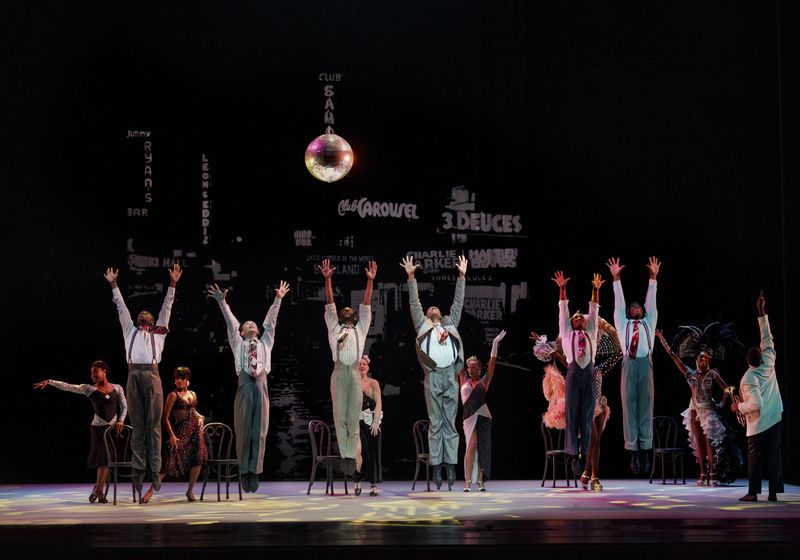
Photo: Alvin Ailey American Dance Theater in Alvin Ailey’s “For Bird – With Love.” Photo by Paul Kolnik
Presented by the Celebrity Series of Boston
Performed by the Alvin Ailey American Dance Theater
Alvin Ailey, founder
Judith Jamison, artistic director emerita
Matthew Rushing, interim artistic director
May 2 – 5, 2024
Boch Center, Wang Theatre
270 Tremont St.
Boston, MA 02116
Review by Craig Idlebrook
BOSTON, Mass. — Choreographer Alvin Ailey often felt the need to mask much of his private life to the public, but he unabashedly shared the emotion of his art with audiences. A publicly closeted gay Black man with bipolar disorder who grew up in the southern United States during the height of the brutality of the Jim Crow era, he staged heartfelt shows reflecting the highs and lows of Black life through dance.
In a 1973 New York Times Magazine interview, he said of his shows, “They are as honest and truthful as we can make them. I’m interested in putting something on stage that will have a very wide appeal without being condescending; that will reach an audience and make it part of the dance.”
That emotional integrity of Ailey’s work was evident in the recent staging of Ailey Classics, featuring excerpts of his most well-known works by the dance troupe he founded. More than 30 years after Ailey’s death, there were moments on stage when it felt as if he were personally greeting each member of the audience through his art.
The show, a selection of dance numbers staged from 1960 to 1988, has been curated to reflect Ailey’s most accessible works, and skews toward his more optimistic numbers, making it a great introduction for younger audiences. He created much of his work in a cultural desert, when there were few examples of mainstream art that respectfully and accurately reflected Black American life. Through Ailey, the audience share the dancers’ joy during tableaus of the swing and jazz eras and feel the uplift of a fevered church revival.
The show also includes a few poignant pieces reflecting personal loss, spiritual doubt, and political apathy, giving us all the more reason to celebrate when we can. These earned moments of Black joy are as needed now as they were when first staged and can offer precious moments of fortification against the continued grind of white supremacy.
While this show gives us tantalizing glimpses of Ailey’s genius, it doesn’t hold up as well as a cohesive work. Most of the selected pieces show vital beats of ongoing stories, and each left me wanting to know what might have come before or after it. At least one number, an excerpt from Masekela Langage, feels incongruous. That show, originally staged in 1969, attempts to draw parallels between race-induced violence in the United States and Apartheid-era South Africa. Such a connection feels lost without the proper context in this staging, and runs close to feeling like activist tourism.
For better and worse, Ailey Classics serves the same function as a greatest hits album, opening the door for new viewers to walk through. If the viewer accepts the invitation, they may look back at this show and see how mismatched it seems in reflection.
